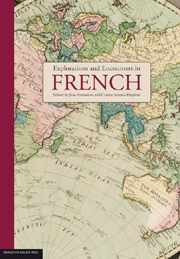Book contents
- Frontmatter
- Contents
- Foreword and Acknowledgements
- Expressions of Support
- Editors' Note
- Encountering French and the French
- Historical Explorations
- The Inaugural Frank Horner Lecture
- Writing and Rewriting the Baudin Scientific Expedition to the Southern Hemisphere, 1800-1804
- Doing it by the Book: Breaking the Reputation of Nicolas Baudin
- Intercultural Encounters
- Explorations in the Classroom
- Table of Illustrations
- Appendix 1 Conference History
- Appendix 2 Contents of the CD-ROM
Writing and Rewriting the Baudin Scientific Expedition to the Southern Hemisphere, 1800-1804
from Historical Explorations
Published online by Cambridge University Press: 05 June 2012
- Frontmatter
- Contents
- Foreword and Acknowledgements
- Expressions of Support
- Editors' Note
- Encountering French and the French
- Historical Explorations
- The Inaugural Frank Horner Lecture
- Writing and Rewriting the Baudin Scientific Expedition to the Southern Hemisphere, 1800-1804
- Doing it by the Book: Breaking the Reputation of Nicolas Baudin
- Intercultural Encounters
- Explorations in the Classroom
- Table of Illustrations
- Appendix 1 Conference History
- Appendix 2 Contents of the CD-ROM
Summary
I am greatly honoured to have been invited to give the first Frank Horner Memorial lecture. I have been working on the Baudin expedition for many years, since 1987, and Frank Horner's wonderfully lucid, scholarly book has been my bible and guide, as it has been, and continues to be for so many other scholars in the field. I can say that the present flowering of work on the expedition would not be possible without the firm and enduring foundation stone of The French Reconnaissance, which I am pleased to record, has now been published in French translation and which it is hoped will make Frank's contribution more widely known amongst scholars in Francophone world who are working on early French exploration.
The Baudin scientific expedition was commissioned by Bonaparte, then First Consul, to explore the Southern Hemisphere and visit Timor and New Holland. It left Le Havre on 19 october 1800 under the leadership of Nicolas Baudin in charge of the Géographe, and Emmanuel Hamelin, captain of the Naturaliste. Baudin died on the return journey in Mauritius and the Géographe, captained now by Pierre-Bernard Milius, arrived at the port of Lorient on 24 March 1804, the Naturaliste having arrived at Le Havre on 7 June 1803.
We, a team consisting of Jean Fornasiero, John West-Sooby and myself, together with a Belgian colleague, Michel Jangoux, received an ARC Discovery Grant in 2005 to write a new history of the French expedition.
- Type
- Chapter
- Information
- Explorations and Encounters in French , pp. 103 - 134Publisher: The University of Adelaide PressPrint publication year: 2010
- 2
- Cited by



